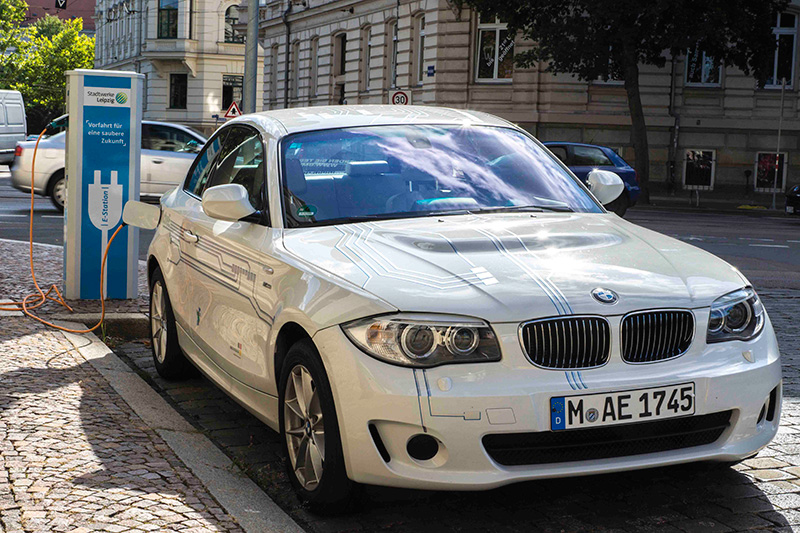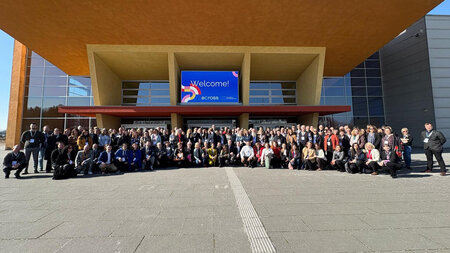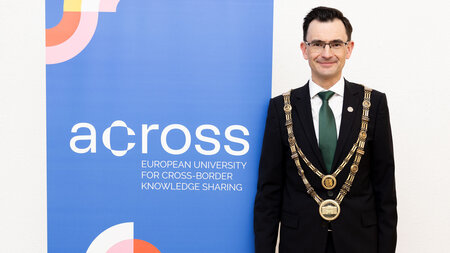Electric vehicle range in 450,000 kilometer real-world test
Psychologists at TU Chemnitz have explored the conditions under which electric mobility can also work under particularly challenging range demands of users
-

The engineering psychologists from Chemnitz recorded all trips completed by test drivers with their BMW ActiveE with GPS loggers. These trips often led to destinations in Saxony, but also partly to destinations like Berlin or Hannover. Source of the map database: OpenStreetMap contributors -

Members of the e-mobility research team of the Professorship of Cognitive and Engineering Psychology at TU Chemnitz assessed the subjective evaluations of electric vehicle users through interviews and questionnaires in terms of acceptance and suitability for everyday use, range utilization and range stress. Photo: Katja Schleinitz -

A BMW ActiveE with which the study was conducted at a charging station of Stadtwerke Leipzig. Photo: Torsten Strom
75 commuters in and around Leipzig used a BMW ActiveE electric car on a daily basis for three months each, covering about 450,000 km between May 2013 and December 2014. The Professorship of Cognitive and Engineering Psychology at Technische Universität Chemnitz was responsible for the scientific user research. Together with their project partners – the BMW Group and the Stadtwerke Leipzig – the psychologists studied how an electric vehicle with a present day typical range of around 150 kilometers can also be used comfortably near the limits of available range. Results showed that more than 80 percent of the test drivers considered the available range sufficient for everyday use.
On average, users completed about 90 kilometers per day with the ActiveE. 38 percent of the participants drove even over 100 kilometers and some individual users drove up to 6,000 kilometers in the first six weeks. The longest driven distance of a driver in one day was 367 km. Over the entire period, 91 percent of all journeys could be carried out with the electric vehicle. As expected, the main reason for inability to use the vehicle was a large planned total trip distance in half of the cases.
“For us, the exciting question was to see how users experience the everyday use of their electric vehicles and the charging infrastructure when having particular high range demands “, explains Prof. Dr. Josef Krems, holder of the Professorship of Cognitive and Engineering Psychology, and adds: ”Overall, electric mobility also works for users who often travel long distances. Yet, there is also potential for assistance concepts that simplify the interaction with range even further.“ Confirmed was the expectation of the researchers that, with increasing usage duration and experience, stressful situations because of the range become more seldom – after adaptation to the range, there was an average of only 1.35 such situations per month. At the same time, users came near the limits of range during usage: On average, the lowest displayed charge level of a user was six percent. Half of the participants even drove their car down to four percent charge level at least once.
The results provide an indication of how important a reliable and comprehensible range indicator is, particularly for trips that approach the limits of range. Those participants who developed a high trust in the range prediction system showed significantly less range stress during usage. At the same time, the users developed suggestions for improvements on the basis of their experience. For instance, the references period of the range estimation should be flexibly adjustable and consider different types of drivers as well as driving styles. Furthermore, the users would benefit from a range indicator that makes more transparent which information is being incorporated in which way in the estimation.
“As a project team, we are just at the beginning of examining the large corpus of interesting data. We are very much looking forward to see the results and what insights can be gained to advance the user-centered development of sustainable electric mobility systems“, said Dr. Thomas Franke, researcher at the Professorship of Cognitive and Engineering Psychology. The Federal Ministry for the Environment, Nature Conservation, Building and Nuclear Safety (BMUB) funded the research project within the Bavarian-Saxon e-mobility showcase ELECTROMOBILITY CONNECTS (“ELEKTROMOBILITÄT VERBINDET”). The Professorship of Cognitive and Engineering Psychology at TU Chemnitz conducts research on various topics in the field of traffic psychology, electric mobility and usability. Those who would like to be listed as future study participants in the participant database of the professorship, please register under mytuc.org/dksz.
Contact: Dr. Thomas Franke, Professorship of Cognitive and Engineering Psychology, Phone +49 371 531-37589, Email thomas.franke@psychologie.tu-chemnitz.de
(Translation: Nataliia Boiko)
Katharina Thehos
30.03.2015





